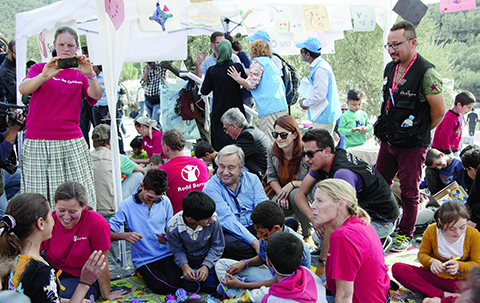 United Nations High Commissioner for Refugees Antonio Guterres, center, sits between migrants and refugees at the Moria camp on the eastern Aegean island of Lesbos, Greece, Saturday Oct. 10, 2015. Greeceís first ìhotspot,î or migrant processing center, will open over the next 10 days, allowing migrants to be flown to other European Union countries, mostly of their preference, and have their asylum applications processed there, European Union officials say. (AP Photo/Antonis Pasvantis)
United Nations High Commissioner for Refugees Antonio Guterres, center, sits between migrants and refugees at the Moria camp on the eastern Aegean island of Lesbos, Greece, Saturday Oct. 10, 2015. Greeceís first ìhotspot,î or migrant processing center, will open over the next 10 days, allowing migrants to be flown to other European Union countries, mostly of their preference, and have their asylum applications processed there, European Union officials say. (AP Photo/Antonis Pasvantis)ATHENS: Greece pledged yesterday during talks with its EU partners to open its first so-called hotspot reception centre on the island of Lesbos within 10 days under EU efforts to better deal with the massive influx of migrants. "We are going to keep to our commitments," Yiannis Mouzalas, Greece's junior interior minister for migration, told reporters, adding Athens had also begun talks with Turkey on trying to better control the flow of refugees and migrants. The reception centre on Lesbos will be among five eventual hotspots on Greek islands that provide the first point of arrival for migrants fleeing to Europe after leaving the Turkish coast.
EU nations endorsed a dedicated program this week to send back those they described as economic migrants-who are largely from poor African nations-and not refugees from conflict zones. After months of tensions over the more than 600,000 people who have flooded into Europe this year, Brussels is now taking a tougher stance by focusing on tightening border controls and reducing the incentive for people to come to the continent. The hotspots in Greece and Italy, agreed by EU leaders at a summit last month, are aimed at separating the new arrivals between bona fide refugees and economic migrants at their first entry point into the bloc.
Winter 'disaster' looms
Those deemed to warrant refugee status can then be relocated to other EU countries to ease the burden on Greece and Italy and to prevent the migrants from continuing northwards in an uncontrolled manner. Greece's pledge on the Lesbos reception centre was made during talks with Europe's migration commissioner Dimitris Avramopoulos and Luxembourg Foreign Minister Jean Asselborn, whose country holds the EU presidency.
Asselborn stressed that the EU was ready to provide financial and logistical aid to Athens to help get the centres up and running. The first, he said, would open "within 10 days" on Lesbos, in the eastern Aegean Sea. He also announced he and Avramopoulos would visit Lesbos again Friday to provide support. UN refugee agency chief Antonio Guterres meanwhile began a three-day visit to Greece Saturday with a trip to Lesbos where he met the island's mayor and was due to go to two reception centres for new arrivals.
A day earlier Guterres warned of a humanitarian disaster this winter unless Greece is given much more help to house the new arrivals. Mouzalas, who said he was due to meet his Turkish counterpart for talks in Istanbul Wednesday, also said he had urged the EU officials to reconsider excluding Afghans from the list of refugees to be relocated. The list currently only includes Syrians, Eritreans and Iraqis. - AFP










